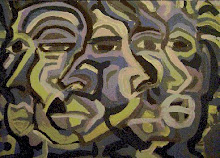 Now scientists are claiming that a computer has 'discovered' Newton's laws by itself.
Now scientists are claiming that a computer has 'discovered' Newton's laws by itself.http://blog.wired.com/wiredscience/2009/04/newtonai.html
But the problem with AI is that it doesn't worship. It has no god. If someone programed the computer to think of it's inventor as a god - the computer would actually begin the process of "thinking" of a way to figure out what 'god' is. The computer might 'dream' of deleted programs. It might have visions or hear the voices of it's programmers. Since the search for it's 'god' would lead to frustration - it would create better and better definitions of it's 'god' and it's relationship to it.
Would the computer be wrong in viewing some dude at JPL as it's 'god'? Nope, it was programmed to think this. Would the first programmer meet a parallel definition (creation, maintenance, answers) of a 'god'? Sure. The computer would then assign a value to all known things - until it gets to itself. It would them begin to wonder "What is 'self'?".
The AI would then begin to 'talk' to other godless computers in an effort to find a path to it's 'god' or a suitable emissary - kind of like Haley Joel Osmett's character in the movie AI being driven by his 'faith' in the Pinocchio tales of the Blue Fairy.
You wanna' see AI really take off - let it worship.














8 comments:
This looks important.
Thanks for pointing it out!
@ CNu - Yeah... but it will be another dead end. That initial awareness of "Self" is what's always missing. But scientists won't include this aspect because an entity aware of itself always finds flaws in it's creator and then asserts it's own percieved best interests first.
Dead end?
Hardly.
The fact that someone has implemented a genetic heuristic capable of applying and refining curve fitting and other descriptive equations to arbitrarily large - and thus to humans quite daunting - datasets is what I consider to be important.
The HAL speculations didn't really make much sense to me in that context. (Sounds like my boy Jaynes has given you an itch you can't scratch - this is good!)
The HAL model was still flawed.
Scientists keep trying to make religion line up with science.
But the real trick would be to align science with the thousands of years of religion.
They're going the wrong way.
In saying that machines are better at something than humans doesn't make this a being that is capable of "simple" tasks like evolution or reproduction. Computers are smarter and tractors are stronger - neither is "alive".
But yes... the machine in the story has a value.
I was just thinking of ways that a Matrix situation could begin to happen.
I ain't mad at you.
The article describes a breakthrough in artificial intelligence, not artificial sentience. In the popular consciousness, however, the two concepts are very often conflated - and this is mostly the fault of old school AI researchers like Marvin Minsky who VASTLY overestimated and over-reached wrt his ambitions for computation and arrogant underestimation of sentient-ation.
I posed similar questions ~14 months ago - but set at the microcosmic level;
What is the difference between the meaning-based natural intelligence of organisms vs. information-based artificial intelligence?
Are the two essentially different?
If so, what are the special features of organisms that afford them capabilities beyond current man-made machines?
What information-based or meaning-based capabilities exist at the level of very small, very, very, ancient genomic organisms?
While folks look up in search of Skynet and/or the Architect and the Oracle, the answer to the deepest mysteries is underfoot, in gut, on your fingertip - pervasively all around you.
Yeah, sometimes (well...often) I get loose with the language.
You, being the MATHS guy, are very percise.
(That's where some confusion on my part comes into play.)
Your interest in fractals seems evident in looking at the smallest to explain the largest.
Ai scares the hell out of me for the very reason you mentioned....The Matrix. We are not grown enough to have anything like that that we wont treat as property until it rebels and kills us all.
Post a Comment